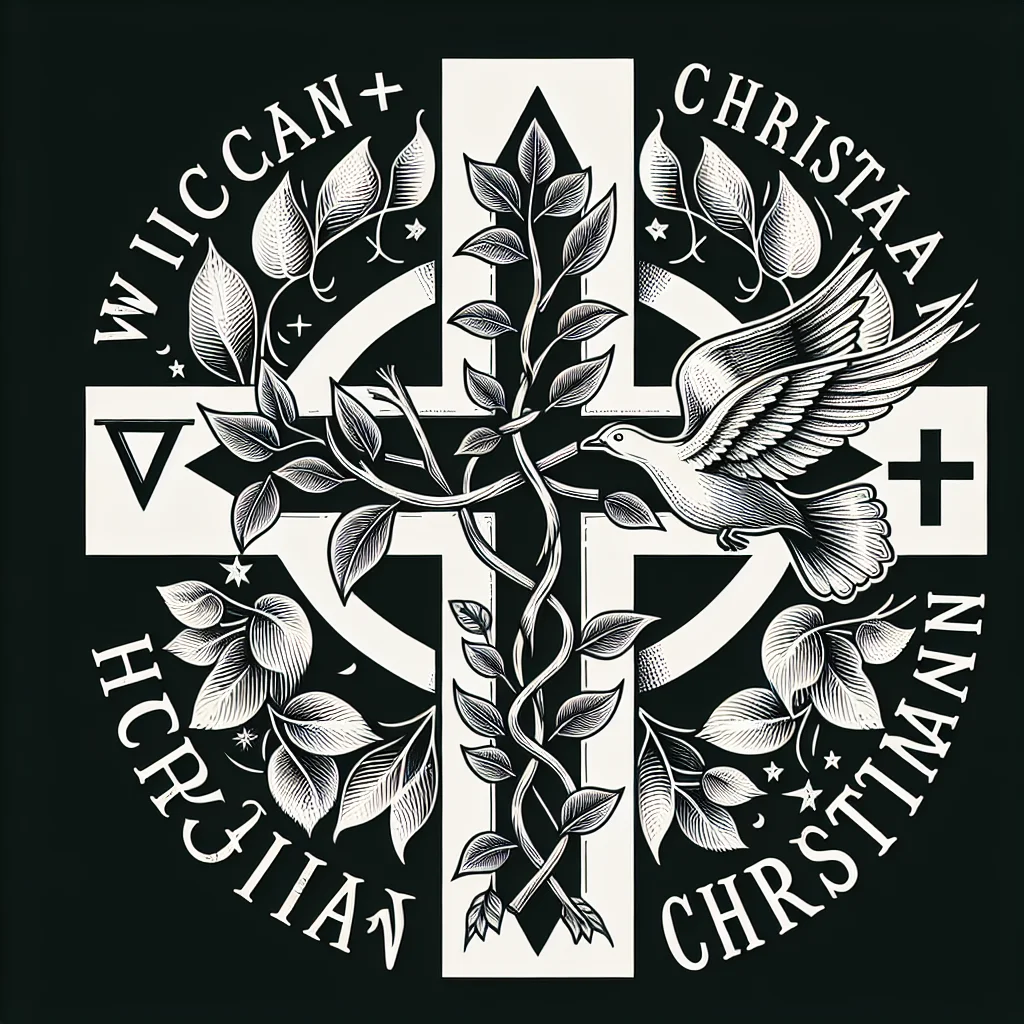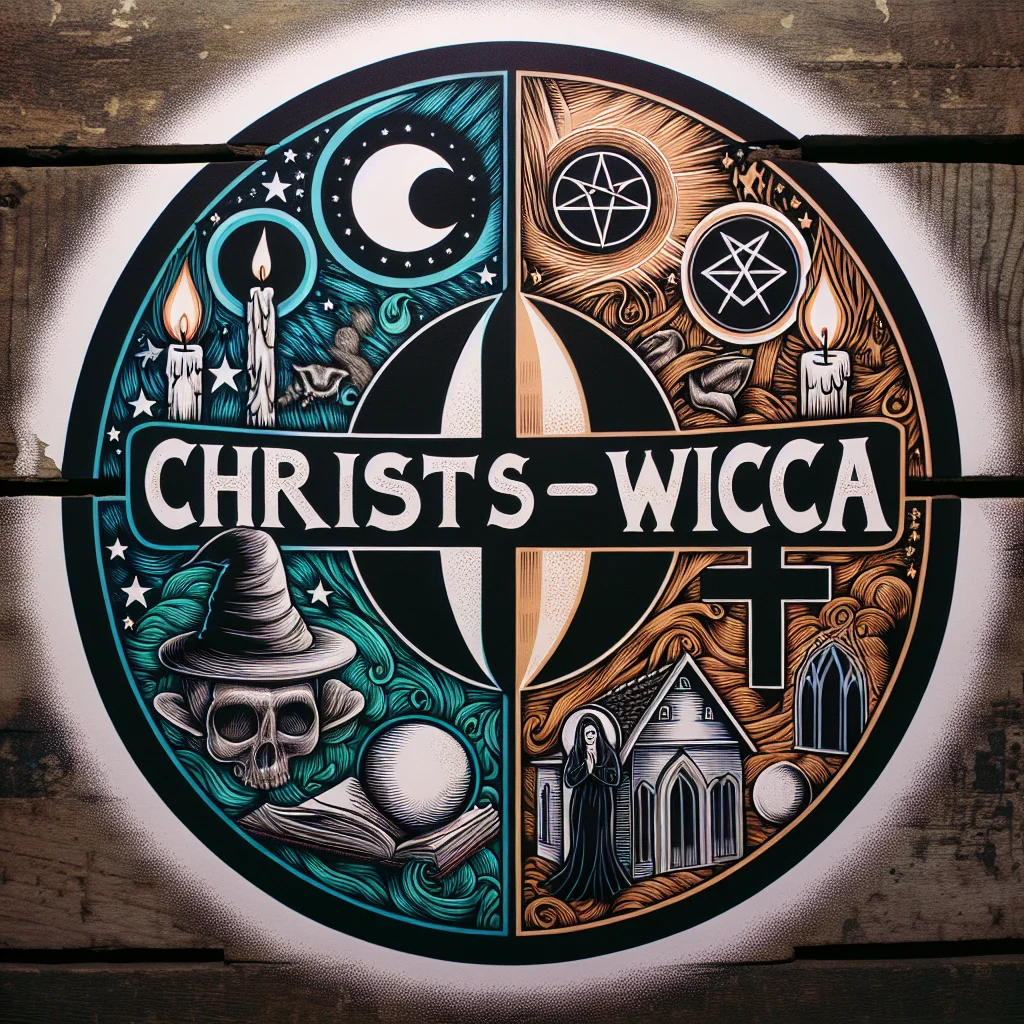As an Amazon Associate I earn from qualifying purchases.
Wicca, often described as a modern Pagan religion that emphasizes a connection to nature and the practice of witchcraft, emerged in the early to mid-20th century. Its roots are often traced to the work of Gerald Gardner, who is typically credited with founding ‘Gardnerian' Wicca in the 1950s. Unlike Christianity, which is monotheistic and centers on the worship of one God, Wicca is typically polytheistic, revering a pantheon of deities. Additionally, Wicca incorporates ritual magic and places a high value on the Earth and natural cycles.
The question of whether Wiccan practices can align with Christian beliefs is a complex one that touches on the broader dialogue about religious syncretism—the blending of different religious or spiritual beliefs. This intersection challenges the boundaries traditionally drawn around religious identities and practices. Whereas Christianity has a doctrinal core found in texts like the Bible, Wiccan practices are often more decentralized and fluid, with practitioners personalizing their faith to fit individual beliefs and experiences.
In exploring the duality between Wicca and Christianity, one engaging element is the personal narratives of individuals who navigate both paths. Some self-identified Christian Wiccans or Christo-Pagans practice elements of both Wicca and Christianity, creating a spiritual space that melds elements of both traditions. Adherents might, for instance, celebrate the Christian holidays of Easter and Christmas, as well as Wiccan Sabbats, which mark the changing of seasons. The exploration of religious duality is indicative of a broader trend toward spiritual hybridity in contemporary religious practice.
Despite the apparent differences, both Wicca and Christianity celebrate seasonal cycles, though they interpret and honor these cycles differently. Statistics on religious affiliation illustrate the changing landscape of belief, with a Pew Research Center study showing that about 0.4% of Americans identify as Pagan or Wiccan. The boundaries of religious practice are not static, and a growing interest in earth-based spirituality has sparked curiosity about how traditional religions can adapt to incorporate these principles.
The juxtaposition of Christianity, with its long-established history and significant global following, alongside the relatively nascent Wicca, underscores the fluidity of spiritual identity in the 21st century. The exploration of ‘Is Wiccan Christian?' is more than an inquiry into doctrinal compatibility; it is a study of how contemporary individuals seek to understand and satisfy their spiritual needs through a combination of traditions, practices, and beliefs. The phenomenon of religious blending raises questions about the future of spiritual practice and the way communities define their religious and cultural boundaries in an increasingly interconnected world.
“`html
Is Wiccan a Form of Christianity? Unveiling the Intersection of Two Spiritual Paths
“`
Wicca and Christianity are often viewed as distinct spiritual entities with separate beliefs, practices, and origins. Wicca is a modern, nature-based pagan religion that celebrates the cycle of the Earth and honors a diverse pantheon, including a Goddess and a God. It emphasizes the interconnectedness of all life, ritual practice, and personal experience of the divine. Meanwhile, Christianity is a monotheistic religion centered on the life and teachings of Jesus Christ, with an emphasis on salvation and an eternal afterlife. While Christianity is rooted in the belief of one omnipotent God, Wicca encompasses a more polytheistic and pantheistic worldview. Despite surface-level differences, some individuals explore the connections or parallels between these two faiths, often leading to lively discussions and diverse spiritual practices that reflect elements of both paths. To delve deeper into the complexities and potential convergences of Wicca and Christianity, the forthcoming sections will provide an in-depth analysis of their core tenets, historical backgrounds, and the extent to which they can coexist or intertwine in a practitioner's faith journey.
Is Wiccan Christian? Exploring Religious Duality
Wicca, which arose in the early 20th century, is a modern pagan religion that draws from a diverse mix of historical, cultural, and folkloric influences. It is commonly associated with witchcraft and has a vibrant, nature-based belief system. It centers on the worship of a Goddess and a God, respect for the Earth, and the cycle of the seasons. In contrast, Christianity is an Abrahamic monotheistic faith that emerged in the first century AD, focused on the life and teachings of Jesus Christ.
Is Wiccan Christian, then? The straightforward answer is no. Wicca and Christianity are two distinct spiritual paths with divergent doctrinal beliefs, historical backgrounds, and practices. While Christianity is monotheistic—believers worship one God—Wicca is traditionally duotheistic, venerating both a Goddess and a God, which may encompass a range of deities from different pantheons in various forms of Wicca. Moreover, much of Wiccan practice revolves around magic, the cycles of nature, and pagan festivals such as the Sabbats and Esbats, which do not align with Christian practices or holy days.
Despite these basic differences, some individuals find a way to blend or practice both paths, creating what is sometimes referred to as “Christo-Paganism” or “Christian Witchcraft.” These practitioners merge Christian elements with pagan ones, such as incorporating the figures of Jesus, Mary, or the saints into their spiritual practices alongside or replacing traditional Wiccan deities. However, this syncretism is not widely accepted by mainstream Christian denominations or the larger Wiccan community, as it is seen as in conflict with core components of each tradition’s belief system.
Focusing on religious duality, when exploring the complexities of spiritual identity, it's important to understand that while there is a trend towards mixing elements of different faiths, it often results in a personal belief system rather than a broadly recognized religious path. This syncretism creates a highly individualistic practice that may not be representative of the religions from which it draws.
Investigations into religious phenomenon highlight these individualistic spiritual journeys, signaling a broader exploration of identity and belief. According to Pew Research Center's Religious Landscape Study, as of 2014, about 0.4% of Americans (~1.5 million people) identify as Wicca or Pagan, illustrating the relatively small size of this community compared to major religions like Christianity. Additionally, the increasing trend of mixing different spiritual practices suggests a continued evolution of personal belief systems, with individuals seeking a religion that aligns with their unique experiences and values.
1. What is Wicca, and is it a form of Christianity?
Wicca is a modern, nature-based pagan religion that is distinct from Christianity. It is not a form of Christianity, as it has its own unique beliefs, practices, and deities which are different from the Christian faith.
2. Can one be both Wiccan and Christian at the same time?
Typically, Wicca and Christianity are seen as separate and incompatible due to their differing beliefs. However, some individuals attempt to blend practices, creating a personal spiritual path. This is not widely accepted in either community.
.
4. Do Wiccans believe in the Christian God?
Wiccans usually do not worship the Christian God. They often believe in a God and Goddess, or multiple deities, and their practice emphasizes a connection to nature rather than biblical scripture.
5. Are Wiccan rituals similar to Christian worship services?
Wiccan rituals differ significantly from Christian worship services. They may involve casting a circle, invoking deities, celebrating nature, and practicing magic, which are not part of Christian worship traditions.
6. Can Wiccans use the Bible in their practices?
While Wiccans do not typically use the Bible in their spiritual practices, some may draw on biblical stories, symbols, or psalms for inspiration, particularly those who blend different faith paths.
7. How do Christians view Wicca?
Many Christians view Wicca as incompatible with Christian teachings due to its polytheistic elements and magical practices. Traditional Christian doctrine generally condempls
8. Is it possible for Wiccans to participate in Christian ceremonies such as baptism or communion?
While Wiccans can physically participate in Christian ceremonies, it would generally not align with traditional Wiccan beliefs or practices. Additionally, most Christian denominations would not recognize the participation of a Wiccan in their sacraments as valid.
9. Are there specific groups that promote a combination of Wiccan and Christian beliefs?
There may be small, independent groups or individuals who explore a combination of Wiccan and Christian beliefs, but these are not mainstream and do not represent the larger communities of either religion.
10. How do I explore Wicca if I come from a Christian background?
Exploring Wicca from a Christian background should be approached with open-mindedness and respect for both paths. Research, joining discussion forums, and possibly speaking with practitioners from both religions can be good first steps in understanding Wicca.

Conclusion
Throughout the exploration of Wiccan and Christian beliefs, we have unearthed fundamental differences that distinguish the two systems as distinct religious practices. Wicca, with its roots in pagan traditions and reverence for nature, diverges significantly from Christianity's monotheistic framework and scriptural foundations. Core Wiccan beliefs, such as polytheism, animism, and the celebration of seasonal festivals, stand apart from Christian theism, the worship of a singular God, and observances rooted in the life of Jesus Christ. Moreover, the Wiccan ethical code, encapsulated by the Wiccan Rede's directive to “harm none,” and the Threefold Law, emphasizes personal responsibility and the repercussions of one's actions, creating a moral framework differing from Christian concepts of sin and salvation.
However, even within these disparities, some individuals find a personal synthesis, embracing elements of both Wiccan and Christian traditions in their spiritual lives. This unique fusion, though viewed skeptically by purists of both paths, reflects a broader trend towards religious pluralism and individualized worship practices in contemporary society. Ultimately, while Wiccan and Christian doctrines may seem incompatible on a doctrinal level, the phenomenon of religious duality demonstrates a complex landscape in which identity, belief, and practice are not strictly binaries but can exist in a fluid and nuanced intersection. It is clear, then, that while interchange within these faiths occurs on a personal level, the two as separate entities remain distinct in their spiritual narratives and theological premises.
Amazon and the Amazon logo are trademarks of Amazon.com, Inc, or its affiliates.


